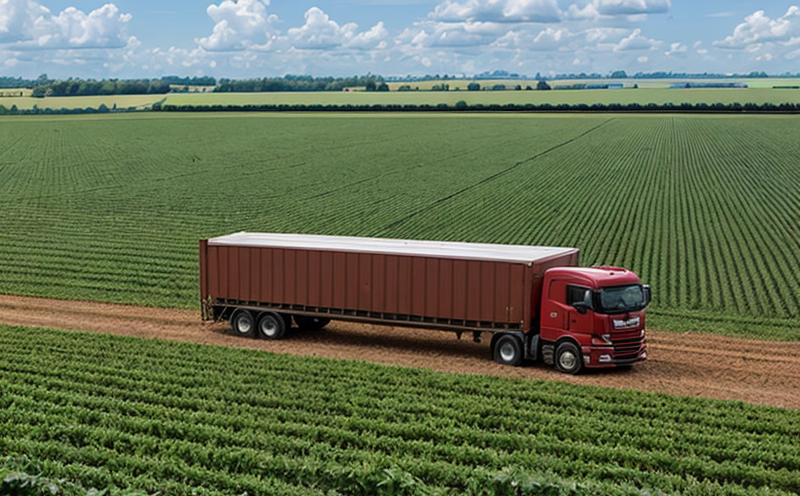Vibration Isolation Testing for Perishable Food Transport
Perishable food products are highly sensitive to environmental conditions during transport and storage. The integrity of these goods can be compromised by even minor vibrations, which can cause physical damage or spoilage leading to significant economic losses. Ensuring the proper vibration isolation is crucial in maintaining product quality and extending shelf life.
Vibration isolation testing plays a pivotal role in safeguarding perishable foods from damage during transport. This involves subjecting packaging materials used for transporting such goods to controlled vibrations that mimic real-world conditions encountered during transit, such as road bumps, jolts, or rough handling at ports of shipment and unloading.
The primary goal is to evaluate the effectiveness of the packaging and its ability to dampen and absorb shock waves. This ensures that the products remain undamaged by minimizing the impact of external forces. The testing process typically includes rigorous simulation of various transport scenarios using specialized equipment like shakers, vibration tables, and drop test machines.
For instance, in a typical test scenario, packaging samples are placed onto a vibrating platform where they undergo controlled frequency and amplitude vibrations that simulate potential transportation conditions. The tests aim to assess the resilience of the packaging under different environmental stressors, such as temperature fluctuations, humidity variations, and mechanical impacts. By understanding these factors, manufacturers can optimize their packaging designs for better performance.
The importance of this service cannot be overstated in today's globalized market where perishable goods are transported over vast distances. Effective vibration isolation helps maintain the quality and safety of products like fresh produce, dairy items, and pharmaceuticals that require stringent temperature controls during transit to prevent spoilage or degradation.
Accurate testing is essential for compliance with international standards such as ISO 12219-3:2008 which sets guidelines for packaging transport simulation tests. Adhering to these standards ensures consistency in quality and reliability across different regions, enhancing consumer trust and satisfaction. Moreover, it supports the development of sustainable and eco-friendly packaging solutions that minimize environmental impact while maximizing product protection.
Eurolab Advantages
- State-of-the-art Facilities: Equipped with the latest vibration isolation equipment tailored for perishable food transport packaging.
- Experienced Technicians: Our team comprises experts in packaging and transport simulation, ensuring accurate and reliable testing results.
- Comprehensive Reporting: Detailed reports not only document test outcomes but also offer actionable insights to improve your packaging solutions.
- Client-Centric Approach: We work closely with you throughout the testing process to understand your specific needs and goals, delivering tailored services that meet your requirements.
International Acceptance and Recognition
Eurolab's commitment to quality and innovation has earned us a reputation as a leader in agricultural & forestry testing. Our vibration isolation tests for perishable food transport are recognized worldwide, ensuring that your packaging solutions meet the highest international standards.
We have worked with numerous clients across various sectors, including agriculture, forestry, and logistics, all of whom trust our expertise to deliver reliable results. Compliance with global standards like ISO 12219-3:2008 is just one example of how we ensure that your products meet the stringent requirements set by international bodies.
Our rigorous testing processes are designed to mirror real-world conditions, providing you with a clear understanding of how your packaging will perform under various transport scenarios. This not only helps in maintaining product quality but also supports sustainable practices by minimizing waste and ensuring efficient use of resources.
Competitive Advantage and Market Impact
- Enhanced Product Quality: By eliminating the risk of damage from vibrations, you can ensure that your products reach consumers in optimal condition, thus enhancing brand reputation.
- Increased Customer Satisfaction: Satisfied customers are more likely to remain loyal to your brand, leading to increased sales and market share growth.
- Regulatory Compliance: Adhering to international standards ensures that your packaging meets the necessary regulatory requirements, reducing the risk of legal issues and penalties.
- Sustainable Solutions: Our tests help identify ways to make your packaging more sustainable by minimizing waste and optimizing resource use. This contributes positively to environmental protection efforts.
The competitive advantage that Eurolab offers lies in our ability to provide comprehensive, accurate, and timely testing services. By partnering with us, you gain access to expert knowledge and advanced technology, ensuring your products are protected effectively during transport. This leads to improved customer satisfaction, enhanced brand reputation, and increased market competitiveness.





